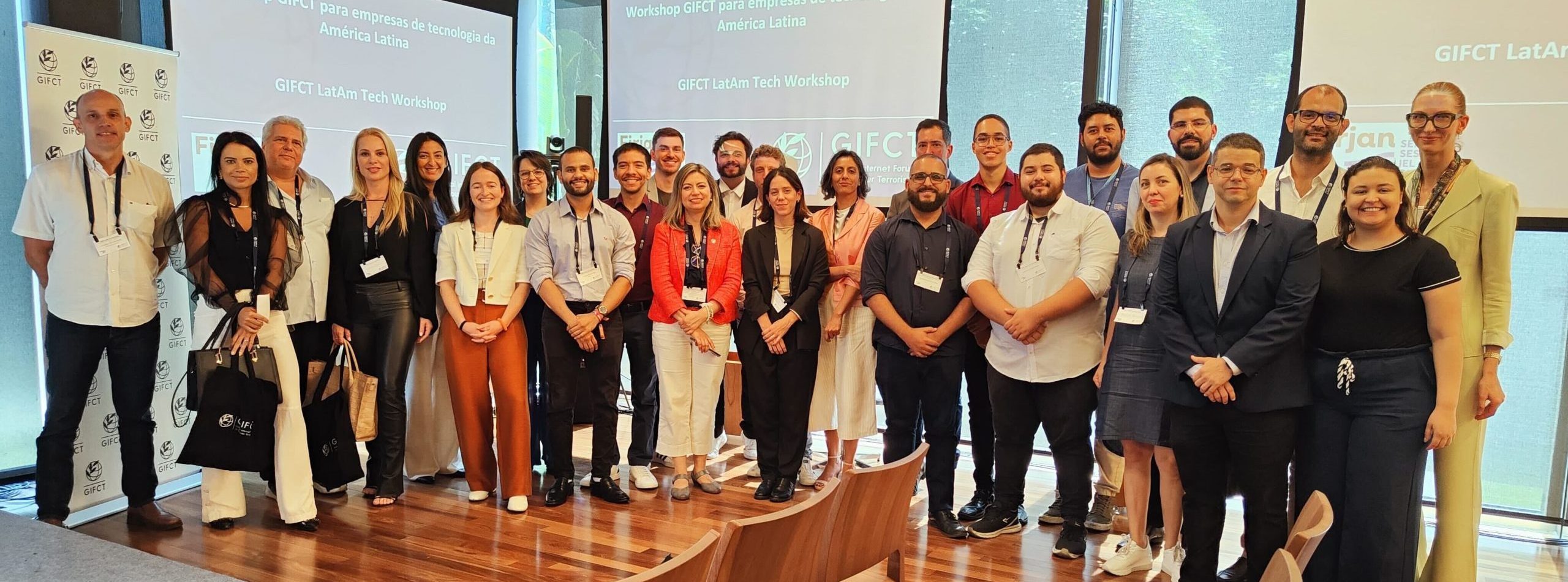GIFCT, in partnership with the Industry Federation of the State of Rio de Janeiro (Firjan), convened a Latin American tech workshop on April 16, 2024 in Rio de Janeiro, Brazil.
This event brought together local and regional industry bodies, tech companies, and experts interested in understanding the digital landscape in Latin America and global trends in counterterrorism and counter-extremism efforts. The workshop included briefings from GIFCT member tech company Yubo, Brazil’s Intelligence Agency (ABIN), and the United Nations Security Council Counterterrorism Executive Directorate (UN CTED).
During the workshop, participants discussed instances of global terrorist and violent extremist exploitation of platforms in Latin America, preventative countermeasures, and sector-specific tools and resources to prevent and counter terrorism and violent extremism online. The workshop also highlighted steps that tech companies can take towards becoming GIFCT members and how to benefit from cross-platform and multi-stakeholder solutions.

Latin America Trends
Participants’ primary concerns related to terrorism and violent extremism in the region centered on four themes: (1) crime-terror nexus, (2) increase in school shootings, (3) conspiracy theory-driven violent extremism, and (4) Islamist extremist terrorism.
Crime-terror Nexus
Both panelists and participants discussed Latin America’s crime-terror nexus, in which drug trafficking cartels and organized crime groups resort to terrorism or work directly with terrorist entities to achieve their objectives across Latin American borders. Notably, some of these regional crime organizations have been designated as terrorist organizations by governments, and several regional practitioners and stakeholders have previously noted the increasing intersections not just among illicit groups, but also in the kinds of approaches needed to address these crimes, which can require overlapping responses. These networks have moved their activities increasingly online to organize and plan their operations.
Further collaborations between law enforcement and tech companies—especially based on trust and a respect for human rights and transparency —could strengthen counterterrorism efforts. The importance of this has been highlighted in international frameworks, such as UN Security Council Resolution 2482 on the intersections of organized crime and terrorism. More progress is needed to counter money laundering through cryptocurrencies, fundraising, and the exploitation of end-to-end encrypted and less regulated online chat spaces.
Increase in School Shootings
A rise in school shootings, particularly in Brazil, was also raised as a growing concern by regional practitioners. These shootings are often accompanied by an online element, such as the sharing of perpetrator videos and attacker manifestos on tech platforms. In some instances, attackers have been found to have links with neo-Nazi and white supremacist sympathizing networks. With sympathizer networks online, more investments are needed in intervention and prevention work in the region, particularly to safeguard younger users from engaging with more extreme content related to school shootings.
Conspiracy Theory-Driven Violent Extremism
Similar to other regions, Latin America also saw increasing links between violent extremism and conspiracy theories during the Covid-19 pandemic, which have since evolved into election conspiracies and anti-democratic extremist networks. Misinformation continues to inspire xenophobic and hate-based extremist groups, normalizing anti-democratic discourse and mainstreaming violent extremist rhetoric. Misinformation and conspiracy theory-driven movements online in Latin America mirror similar global dynamics; they are more politically motivated than ideologically aligned, with supporters of these movements believing mainstream political processes are failing to address their grievances.
Islamist Extremist Terrorism
Islamist extremist terrorism is also a concern in Latin America. Brazil, Argentina, and Paraguay in particular experienced attacks in the early and mid-nineties. As tensions increase in the Middle East, Latin America is also increasing its awareness of potential knock-on effects and threats from local networks. Regional governments and stakeholders have long expressed concerns that, while distant from conflict zones and the core leadership of groups like ISIS and Al-Qaida, states and citizens may nonetheless be affected and be vulnerable to exploitation by such groups.
Next Steps
There is both the interest and will to collaborate further in the region to ensure tech companies can better understand the regional context in Latin America and to work with partners on the ground to further counterterrorism and counter-extremism efforts.
GIFCT will be following up with industry bodies to pursue GIFCT membership and partnership through further regional workshops or working groups. GIFCT will also be connecting local practitioners and experts with our academic wing, the Global Network on Extremism and Technology (GNET), to amplify the voices of regional experts in developing action oriented resources and briefings.
We thank all participants for their support of our mission to prevent terrorists and violent extremists from exploiting digital platforms. GIFCT recognizes that this mission must start with voices and perspectives from a range of sectors and world regions to reach a shared understanding of the problems we seek to counter. We are deeply grateful to Firjan for hosting GIFCT’s workshop and working closely with our team to identify local and regional participants to invite and look forward to further collaborations in the region.
This workshop follows on a long series of regional events and engagements conducted by GIFCT to ensure that members and partners can share insights on regional terrorism and counterterrorism dynamics and better understand the trends and implications online. To date, our events have been held in diverse regions and locations, including, for example, Tokyo, Ottawa, Singapore, and Accra. To learn more about our past events, please visit our News webpage.



